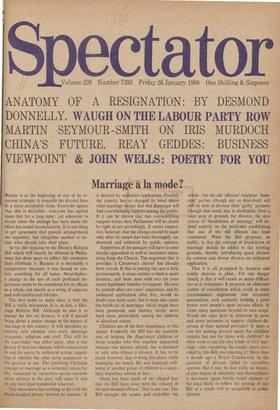is divorce by u4ateral application. Possibly the country hasro changed
its mind about what marriage means that this departure will find overwhelming Support among the public. If it can be shown that this overwhelming support exists, then Parliament will no doubt be right to act accordingly. It seems impera- tive, however, that the change should be made only after its nature has been thoroughly un- derstood and endorsed by public opinion.
Supporters of the measure will have to meet secular opposition as well as resistance eman- ating from the Church. The argument that it provides 'a Casanova's charter' has already been voiced. If that is putting the case a little picturesquely, it seems certain to lead to more divorces, and more men with two (or even more) legitimate families to support. Divorce by consent after two years' separation, and by unilateral application after five, would no doubt ease hard cases; but it must also cause the break-up of marriages which might have been preserved, and thereby create more hard cases, particularly among the children of dissolved unions.
Children are of the first importance in this matter. Evidently the Bill has the laudable aim of helping the illegitimate children of those couples who live together unmarried because one partner already has a husband or wife who refuses a divorce. It has to be faced, however, that to bring this about while damaging the family life and financial well- being of another group of children is a singu- larly imperfect reform at best.
Much has been made of the alleged fact that the Bill 'does away with the concept of the matrimonial offence.' This is not true. The Bill changes the names and reshuffles the That it is all prompted by humane and kindly motives is plain. Yet one danger clearly is that it will create as many difficul- ties as it overcomes. It proposes an elaborate system of conciliation which could in some circumstances degenerate into excessive paternalism, with authority holding a great power over people's most private affairs. It raises many questions beyond its own scope. Would the state have to intervene in more and more instances to support children de- prived of their natural provider? Is there a caSe for making divorce easier for childless couples but not for those with children? Is there even a case for two kinds of civil mar- riage—one containing the escape clause pro- vided by this Bill, one rejecting it? More than


































